 If both terms of a fraction be multiplied by the same number, the value of the fraction will remain unchanged. If both terms of a fraction be multiplied by the same number, the value of the fraction will remain unchanged.  A Treatise on Algebra - Page 45by James Edward Oliver, Lucien Augustus Wait, George William Jones - 1882 - 412 pagesFull view A Treatise on Algebra - Page 45by James Edward Oliver, Lucien Augustus Wait, George William Jones - 1882 - 412 pagesFull view - About this book
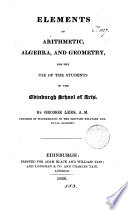 | George Lees - 1826 - 276 pages
...their common denominator. The principle of this rule is, that if the numerator and denominator be both multiplied by the same number, the value of the fraction is not altered. That both terms are multiplied by the same number, by applying the preceding rule, will readily... | |
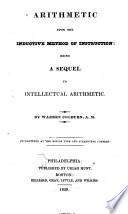 | Warren Colburn - 1829 - 258 pages
...fractions. NB It appears from the above reasoning, that if both the numerator and denominator of any fraction be multiplied by the same number, the value of the fraction will remain the same. It will follow also from this, that if both numerator and denominator can be... | |
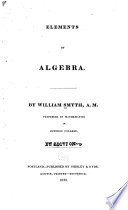 | William Smyth - Algebra - 1830 - 278 pages
...in demonstrating certain properties in relation to known and given numbers. 1.' To demonstrate that if both terms of a fraction be multiplied by the same number, the value of the fraction will not be changed. Let the proposed fraction be designated by p and let n be any number whatever.... | |
 | Augustus De Morgan - 1831 - 108 pages
...result. The most important property of a fraction is, that if both its numerator and denominator are multiplied by the same number, the value of the fraction is not altered ; that is, J is the same as £g-, or each part is the same when we divide 12 inches into 20... | |
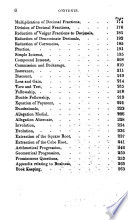 | Charles Davies - Arithmetic - 1833 - 284 pages
...decrease from multiplying the denominator ; hence we have, PROPOSITION V. If the numerator and denominator of a fraction be multiplied by the same number, the value of the fraction mil remain unchanged. Thus, f=fxt=H and 4=* x *=H§ 119- It appears from Prop. II, that if the numerator... | |
 | Silas Totten - Algebra - 1836 - 332 pages
...numerators. Demonstration. — The demonstration of the preceding rule depends upon the following principle. If both terms of a fraction be multiplied by the same number, the value of the fraction is not altered ; for, by multiplying the numerator, the fraction is multiplied (20), and by multiplying the... | |
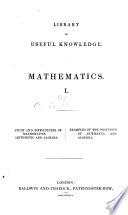 | Mathematics - 1836 - 352 pages
...result. The most important property of a fraction is, that if both its numerator and denominator are multiplied by the same number, the value of the fraction is not altered ; that is, $ is the same as |.|-, or each part is the same when we divide 12 inches into 20... | |
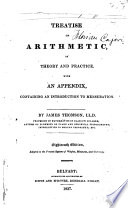 | James Thomson (LL.D.) - Arithmetic - 1837 - 296 pages
...which belong to all fractions : 1. If the terms of any fraction be both multiftlied, or both divided by the same number, the value of the fraction is not changed. 2. A fraction is multiplied by any number either by multiplying its numerator, or dividing Us denominator,... | |
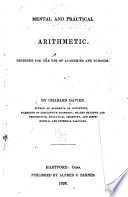 | Charles Davies - Arithmetic - 1838 - 292 pages
...decrease from multiplying the denominator ; hence we have, PROPOSITION V. If the numerator and denominator of a fraction be multiplied by the same number, the value of the fraction will remain unchanged. Q. If the numerator of a fraction be multiplied by a number, how many times... | |
 | James Wood - Algebra - 1841 - 492 pages
...to - of £3, which is also 15 shillings. 12. If the numerator and denominator of a fraction be both multiplied by the same number, the value of the fraction is not altered. For, if the numerator be multiplied by any number, the fraction is multiplied by that number... | |
| |